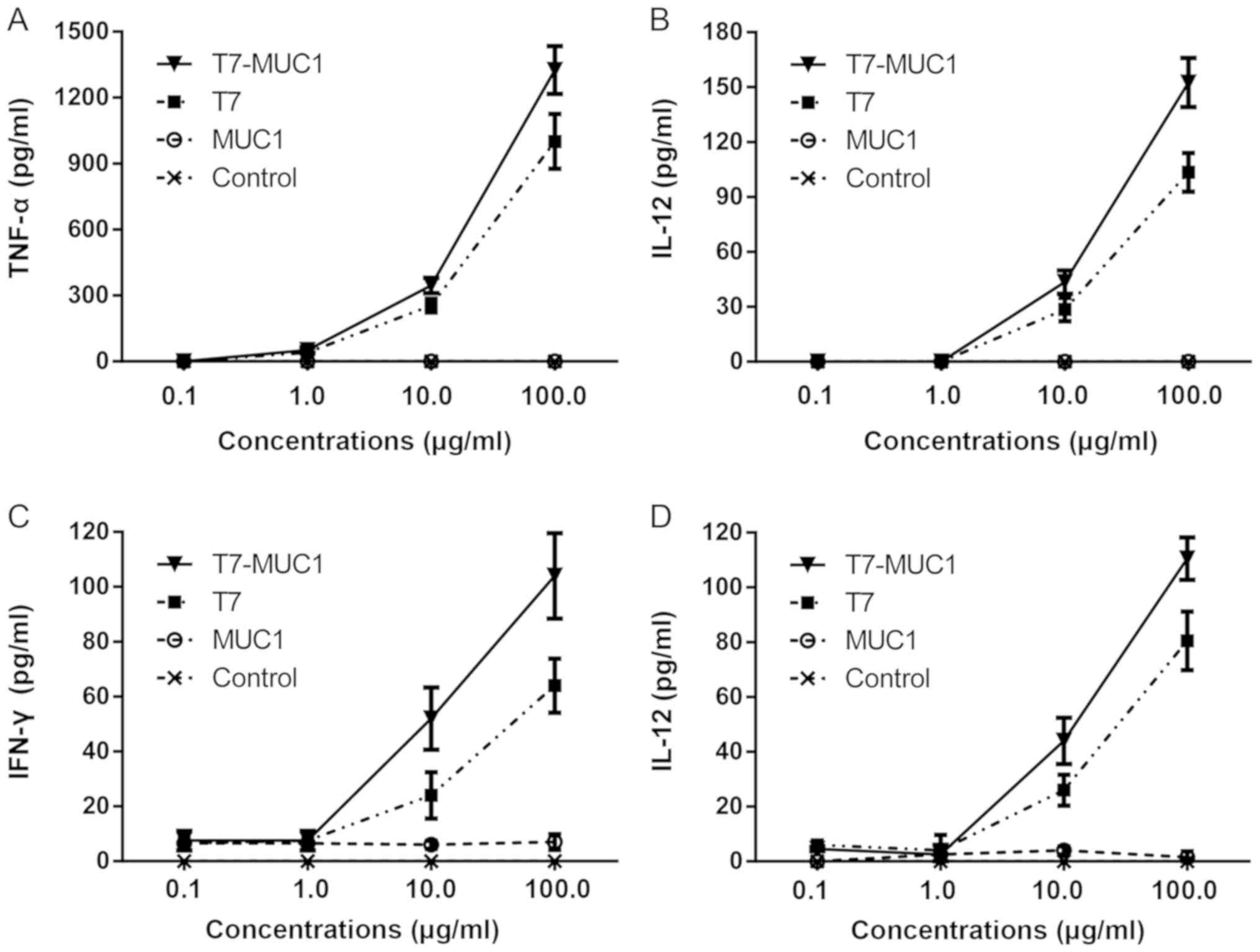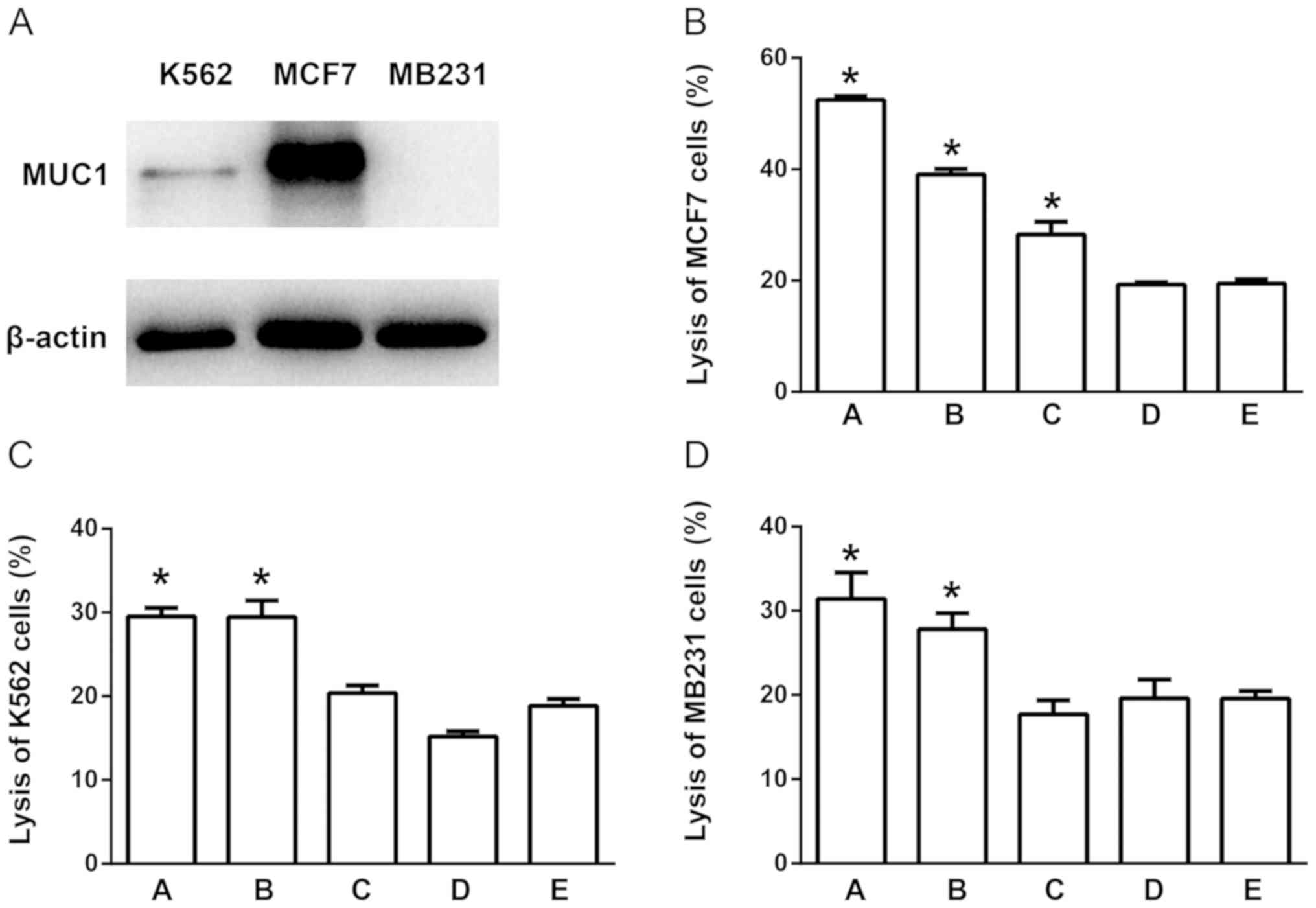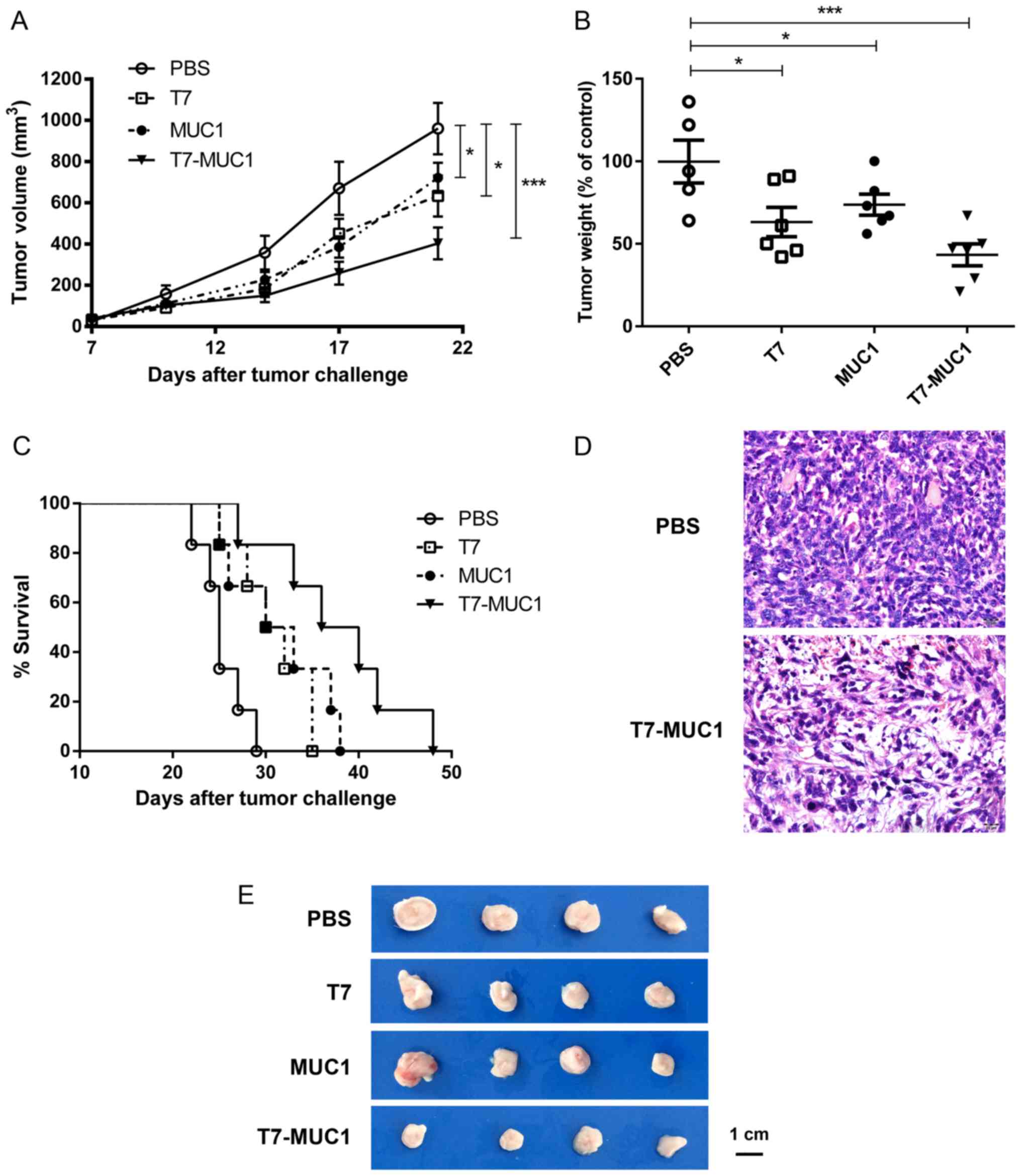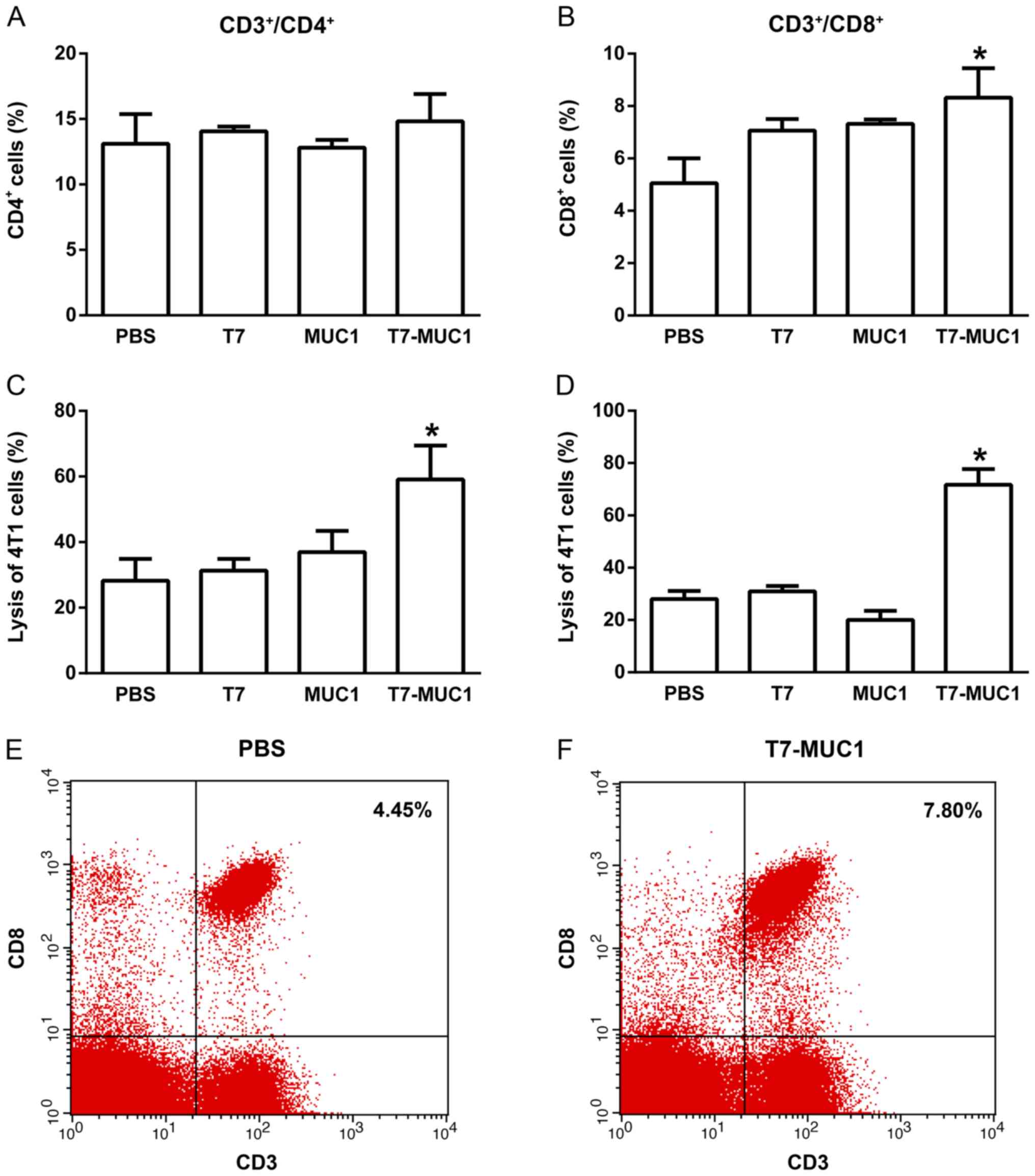|
1
|
Curigliano G, Spitaleri G, Pietri E,
Rescigno M, de Braud F, Cardillo A, Munzone E, Rocca A, Bonizzi G,
Brichard V, et al: Breast cancer vaccines: A clinical reality or
fairy tale? Ann Oncol. 17:750–762. 2006. View Article : Google Scholar : PubMed/NCBI
|
|
2
|
Sangha R and Butts C: L-BLP25: A peptide
vaccine strategy in non small cell lung cancer. Clin Cancer Res. 13
(Suppl):S4652–S4654. 2007. View Article : Google Scholar : PubMed/NCBI
|
|
3
|
Ninkovic T and Hanisch FG: O-glycosylated
human MUC1 repeats are processed in vitro by immunoproteasomes. J
Immunol. 179:2380–2388. 2007. View Article : Google Scholar : PubMed/NCBI
|
|
4
|
Roulois D, Grégoire M and Fonteneau JF:
MUC1-specific cytotoxic T lymphocytes in cancer therapy: Induction
and challenge. Biomed Res Int. 2013:8719362013. View Article : Google Scholar : PubMed/NCBI
|
|
5
|
Taylor-Papadimitriou J, Burchell JM,
Graham R and Beatson R: Latest developments in MUC1 immunotherapy.
Biochem Soc Trans. 46:659–668. 2018. View Article : Google Scholar : PubMed/NCBI
|
|
6
|
Scheid E, Major P, Bergeron A, Finn OJ,
Salter RD, Eady R, Yassine-Diab B, Favre D, Peretz Y, Landry C, et
al: Tn-MUC1 DC vaccination of rhesus macaques and a phase I/II
trial in patients with nonmetastatic castrate-resistant prostate
cancer. Cancer Immunol Res. 4:881–892. 2016. View Article : Google Scholar : PubMed/NCBI
|
|
7
|
Tosch C, Bastien B, Barraud L, Grellier B,
Nourtier V, Gantzer M, Limacher JM, Quemeneur E, Bendjama K and
Préville X: Viral based vaccine TG4010 induces broadening of
specific immune response and improves outcome in advanced NSCLC. J
Immunother Cancer. 5:702017. View Article : Google Scholar : PubMed/NCBI
|
|
8
|
Lakshminarayanan V, Thompson P, Wolfert
MA, Buskas T, Bradley JM, Pathangey LB, Madsen CS, Cohen PA,
Gendler SJ and Boons GJ: Immune recognition of tumor-associated
mucin MUC1 is achieved by a fully synthetic aberrantly glycosylated
MUC1 tripartite vaccine. Proc Natl Acad Sci USA. 109:261–266. 2012.
View Article : Google Scholar : PubMed/NCBI
|
|
9
|
Braunstein MJ, Kucharczyk J and Adams S:
Targeting toll-like receptors for cancer therapy. Target Oncol.
13:583–598. 2018. View Article : Google Scholar : PubMed/NCBI
|
|
10
|
Zhao S, Gao N, Qi H, Chi H, Liu B, He B,
Wang J, Jin Z, He X, Zheng H, et al: Suppressive effects of
sunitinib on a TLR activation-induced cytokine storm. Eur J
Pharmacol. 854:347–353. 2019. View Article : Google Scholar : PubMed/NCBI
|
|
11
|
Coffman RL, Sher A and Seder RA: Vaccine
adjuvants: Putting innate immunity to work. Immunity. 33:492–503.
2010. View Article : Google Scholar : PubMed/NCBI
|
|
12
|
Wang XD, Gao NN, Diao YW, Liu Y, Gao D, Li
W, Wan YY, Zhong JJ and Jin GY: Conjugation of toll-like receptor-7
agonist to gastric cancer antigen MG7-Ag exerts antitumor effects.
World J Gastroenterol. 21:8052–8060. 2015. View Article : Google Scholar : PubMed/NCBI
|
|
13
|
Vascotto F, Petschenka J, Walzer KC,
Vormehr M, Brkic M, Strobl S, Rosemann R, Diken M, Kreiter S,
Töreci Ö and Sahin U: Intravenous delivery of the toll-like
receptor 7 agonist SC1 confers tumor control by inducing a
CD8+ T cell response. Oncoimmunology. 8:16014802019.
View Article : Google Scholar : PubMed/NCBI
|
|
14
|
Kim H, Sehgal D, Kucaba TA, Ferguson DM,
Griffith TS and Panyam J: Acidic pH-responsive polymer
nanoparticles as a TLR7/8 agonist delivery platform for cancer
immunotherapy. Nanoscale. 10:20851–20862. 2018. View Article : Google Scholar : PubMed/NCBI
|
|
15
|
Gao D, Liu Y, Diao Y, Gao N, Wang Z, Jiang
W and Jin G: Synthesis and evaluation of conjugates of novel TLR7
inert ligands as self-adjuvanting immunopotentiators. ACS Med Chem
Lett. 6:249–253. 2015. View Article : Google Scholar : PubMed/NCBI
|
|
16
|
Wang X, Liu Y, Diao Y, Gao N, Wan Y, Zhong
J, Zheng H, Wang Z and Jin G: Gastric cancer vaccines synthesized
using a TLR7 agonist and their synergistic antitumor effects with
5-fluorouracil. J Transl Med. 16:1202018. View Article : Google Scholar : PubMed/NCBI
|
|
17
|
Zhu J, He S, Du J, Wang Z, Li W, Chen X,
Jiang W, Zheng D and Jin G: Local administration of a novel
Toll-like receptor 7 agonist in combination with doxorubicin
induces durable tumouricidal effects in a murine model of T cell
lymphoma. J Hematol Oncol. 8:212015. View Article : Google Scholar : PubMed/NCBI
|
|
18
|
Lin G, Wang X, Yi W, Zhang C, Xu G, Zhu X,
Cai Z, Liu Y, Diao Y, Lin MC and Jin G: A conjugate of
octamer-binding transcription factor 4 and toll-like receptor 7
agonist prevents the growth and metastasis of testis embryonic
carcinoma. J Transl Med. 13:1662015. View Article : Google Scholar : PubMed/NCBI
|
|
19
|
Qiao G, Wang X, Zhou L, Zhou X, Song Y,
Wang S, Zhao L, Morse MA, Hobeika A, Song J, et al: Autologous
dendritic cell-cytokine induced killer cell immunotherapy combined
with S-1 plus cisplatin in patients with advanced gastric cancer: A
prospective study. Clin Cancer Res. 25:1494–1504. 2019. View Article : Google Scholar : PubMed/NCBI
|
|
20
|
Akram M, Iqbal M, Daniyal M and Khan AU:
Awareness and current knowledge of breast cancer. Biol Res.
50:332017. View Article : Google Scholar : PubMed/NCBI
|
|
21
|
Yang Y: Cancer immunotherapy: Harnessing
the immune system to battle cancer. J Clin Invest. 125:3335–3337.
2015. View Article : Google Scholar : PubMed/NCBI
|
|
22
|
Mohit E, Hashemi A and Allahyari M: Breast
cancer immunotherapy: Monoclonal antibodies and peptide-based
vaccines. Expert Rev Clin Immunol. 10:927–961. 2014. View Article : Google Scholar : PubMed/NCBI
|
|
23
|
Morse MA and Whelan M: A year of
successful cancer vaccines points to a path forward. Curr Opin Mol
Ther. 12:11–13. 2010.PubMed/NCBI
|
|
24
|
Cazet A, Julien S, Bobowski M, Burchell J
and Delannoy P: Tumour-associated carbohydrate antigens in breast
cancer. Breast Cancer Res. 12:2042010. View Article : Google Scholar : PubMed/NCBI
|
|
25
|
Beatson RE, Taylor-Papadimitriou J and
Burchell JM: MUC1 immunotherapy. Immunotherapy. 2:305–327. 2010.
View Article : Google Scholar : PubMed/NCBI
|
|
26
|
Adluri S, Gilewski T, Zhang S, Ramnath V,
Ragupathi G and Livingston P: Specificity analysis of sera from
breast cancer patients vaccinated with MUC1-KLH plus QS-21. Br J
Cancer. 79:1806–1812. 1999. View Article : Google Scholar : PubMed/NCBI
|
|
27
|
Musselli C, Ragupathi G, Gilewski T,
Panageas KS, Spinat Y and Livingston PO: Reevaluation of the
cellular immune response in breast cancer patients vaccinated with
MUC1. Int J Cancer. 97:660–667. 2002. View Article : Google Scholar : PubMed/NCBI
|
|
28
|
Khan A, Bakhru P, Saikolappan S, Das K,
Soudani E, Singh CR, Estrella JL, Zhang D, Pasare C, Ma Y, et al:
An autophagy-inducing and TLR-2 activating BCG vaccine induces a
robust protection against tuberculosis in mice. NPJ Vaccines.
4:342019. View Article : Google Scholar : PubMed/NCBI
|
|
29
|
Maynard SK, Marshall JD, MacGill RS, Yu L,
Cann JA, Cheng LI, McCarthy MP, Cayatte C and Robbins SH:
Vaccination with synthetic long peptide formulated with CpG in an
oil-in-water emulsion induces robust E7-specific CD8 T cell
responses and TC-1 tumor eradication. BMC Cancer. 19:5402019.
View Article : Google Scholar : PubMed/NCBI
|
|
30
|
Habijanic J, Berovic M, Boh B, Plankl M
and Wraber B: Submerged cultivation of Ganoderma lucidum and the
effects of its polysaccharides on the production of human cytokines
TNF-α, IL-12, IFN-γ, IL-2, IL-4, IL-10 and IL-17. N Biotechnol.
32:85–95. 2015. View Article : Google Scholar : PubMed/NCBI
|
|
31
|
Sánchez Ramírez J, Morera Díaz Y,
Bequet-Romero M, Hernandez-Bernal F, Selman-Housein Bernal KH, de
la Torre Santos A, Santiesteban Álvarez ER, Martín Bauta Y,
Bermudez Badell CH, de la Torre Pupo J, et al: Characteristics of
the specific humoral response in patients with advanced solid
tumors after active immunotherapy with a VEGF vaccine, at different
antigen doses and using two distinct adjuvants. BMC Immunol.
18:392017. View Article : Google Scholar : PubMed/NCBI
|
|
32
|
Mei Y, Zhao L, Liu Y, Gong H, Song Y, Lei
L, Zhu Y, Jin Z, Ma S, Hu B, et al: Combining DNA vaccine and
AIDA-1 in attenuated salmonella activates tumor-specific
CD4+ and CD8+ T-cell responses. Cancer
Immunol Res. 5:503–514. 2017. View Article : Google Scholar : PubMed/NCBI
|
|
33
|
Jiang S and Yan W: T-cell immunometabolism
against cancer. Cancer Lett. 382:255–258. 2016. View Article : Google Scholar : PubMed/NCBI
|
|
34
|
Lin M, Liang S, Jiang F, Xu J, Zhu W, Qian
W, Hu Y, Zhou Z, Chen J, Niu L, et al: 2003-2013, a valuable study:
Autologous tumor lysate-pulsed dendritic cell immunotherapy with
cytokine-induced killer cells improves survival in stage IV breast
cancer. Immunol Lett. 183:37–43. 2017. View Article : Google Scholar : PubMed/NCBI
|
|
35
|
Zhao Y, Qiao G, Wang X, Song Y, Zhou X,
Jiang N, Zhou L, Huang H, Zhao J, Morse MA, et al: Combination of
DC/CIK adoptive T cell immunotherapy with chemotherapy in advanced
non-small-cell lung cancer (NSCLC) patients: A prospective
patients' preference-based study (PPPS). Clin Transl Oncol.
21:721–728. 2019. View Article : Google Scholar : PubMed/NCBIPubMed/NCBIPubMed/NCBIPubMed/NCBI
|



















